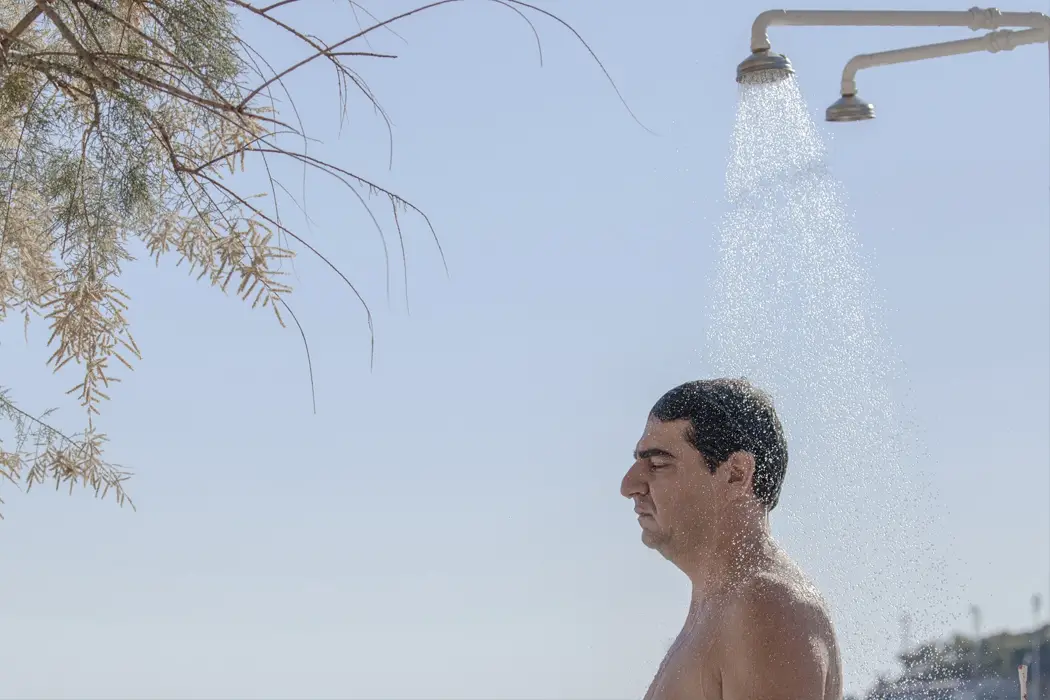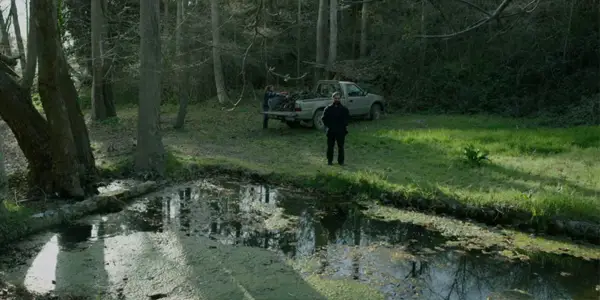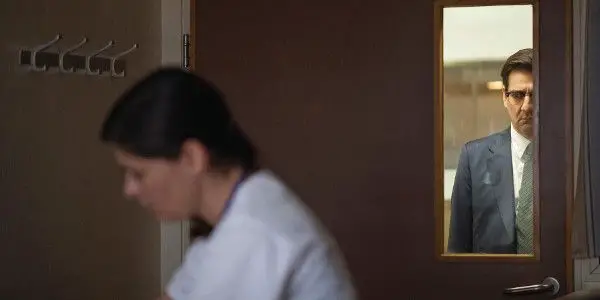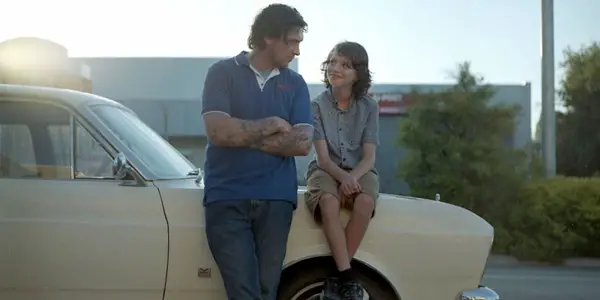The Delphi Bank 25th Greek Film Festival Report

Alex is a 28 year-old West Australian who has a…
In the wake of the 2009 financial crisis in Greece, a new cinematic movement, dubbed the “Greek Weird Wave” emerged. The term was coined after directors such as Yorgos Lanthimos and Panos H. Koutras blended the traditional ideas of Greek Comedy and Tragedy into a varied range of distinctive but uncompromising films which have put Greece back on the International film map.
People may know Dogtooth and Suntan, but The Delphi Bank Greek Film Festival, now in its 25th year, hopes to highlight the current talent that Greece has to offer, from soap-opera inspired thrillers, nihilistic morality plays and heartwarming family dramas, three of which I had to pleasure to catch as the festival begins its Australian tour: Rosemarie, Pity and West of Sunshine.
Rosemarie (Adonis Floridis)

When German writer Heinrich Böll stated that “Not even the devil has sharp eyes like neighbours”, he unwittingly summed up the premise for Adonis Floridis’ genre-bending solo directorial debut feature, Rosemarie. It’s Rear Window meets Adaptation on the island country of Cyprus, where one burnt-out television writer’s alternative methods for revitalising a dying soap opera might shake the foundations of all of the occupants within his small decaying tenement, in this sharp, creative and surprisingly gripping psychological thriller that should hopefully start hitting more international festivals soon.
Yiannis Kokkinos stars as the dishevelled author-turned-soap opera writer Costas (whose situation is similar to Aaron Sorkin’s short-lived days writing for Studio 60 on the Sunset Strip), who is suffering from a debilitating case of writer’s block, choosing to procrastinate within his new apartment, based in a crumbling building that’s filled with an assortment of colourful characters. As the ratings decline for his show, the titular Rosemarie, Costas’ visible contempt for the trashy material prevents him from writing any new episodes, that is until he catches a verbal fight between his new neighbours, a private household who seem to intrigue the bored scribe. His decision to reproduce the scuffle for a new episode proves to be a success, until the need to obtain more material develops into an unhealthy obsession, unearthing past demons from both his and his neighbour’s sordid pasts.
The undisguised exploitation of his neighbour’s domestic issues might sound like a solid setup for an old-school comedic farce (initial comparisons include Noah Baumbach’s underrated Mr. Jealousy and Richard Franklin’s Hotel Sorrento), but when Rosemarie’s frustrated producer gives Costas the advice to “Soap it up and stir things up a bit” in regards to his television writing, it feels like Floridis’ screenplay, much like Charlie Kaufman in Adaptation, takes it own advice, descending the situation into darker and more melodramatic territory, transforming a fun premise into a tense thriller. The revelations uncovered feel contrived at times, but due to the nature of Costas’ literary work, it feels appropriate, as the line between the heightened fiction that he writes and the reality he’s adapting from start to blur.
Despite this, not all of the different plot threads satisfyingly tie together, with three glaring standouts in particular; Costas’ other neighbour, a highly intelligent individual who quickly catches onto his scheme, a brief romantic subplot involving the star of Rosemarie and a prominent recurring gag regarding a irate tenant whose expensive sports car is constantly having its alarm set off, all feel like perfect setups for crises that never come. It all might sound like sleazy material, but Yorgos Rahmatoulin’s fluid camera movements provide an unpretentious stylistic assurance, providing crisp, clear images as the drama thickens.
Rosemarie is the type of film you hope to find at film festivals like these, undiscovered gems from parts of the world where Western audiences only receive the bare minimum – I have to say, it’s nice to see a contemporary Greek film that contains no ties to Yorgos Lanthimos (which is something I cannot say for the next review).
Pity (Babis Makridis)

Whether it appears within the claustrophobic confines of the family home, an isolated hotel made for dating or even a lawyer’s muted apartment, a sense of despair pervades the films of Efthymis Filippou. The Oscar-nominated screenwriter’s latest film, Pity, may be directed by collaborator Babis Makridis (who also co-wrote the screenplay), but the Greek provocateur is more well-known for being Yorgos Lanthimos’ co-writer on both Dogtooth and The Lobster, the back-to-back arthouse hits that kickstarted the current “Greek Weird Wave” movement, a particular style that Pity practically bathes in.
Pity is a dry, formal exercise about that uniquely comforting feeling that empathy can provide during our darkest moments, and how one rigid, perpetually scowling lawyer gets addicted to the “rush” of the constant consolation. With his wife rendered comatose after a freak accident, the lawyer’s (Yannis Drakopoulos) routine life has become fuelled by the sympathies of those around him; his neighbour brings over an orange cake every morning, his dry-cleaner doles out daily condolences and his secretary is always good for a warm hug – all in-between frequent bouts of bedside crying. Just as he’s become comfortable with the commiseration, his situation changes, and just like any addiction, he’s forced to go to great lengths to recapture the same level of, as the title suggests, pity.
From the opening shot alone, one which contrasts the lawyer’s pathetic bawling with the sunny beachside that his stark, drab apartment is ironically adjacent to, you’re intensely aware that you’ve entered Makridis’ world, one defined by a specific storytelling style that dominates at the expense of substance, often reducing humans down to objects, merely defined by either their job or gender. The severe form and deadpan sentimentality are aided by Konstantinos Koukoulios’s precise compositions, which tend to show rather than refer, as the only time we get any insight into our unnamed protagonist’s messed up mindset are through a series of recurring inter-titles that plainly detail his thoughts with a poetic cadence, a decision that sometimes clashes with the coarse realism of the muted visuals.
The Greek Weird Wave’s tendency to be uncompromising towards the audience is to be expected, and the cruelty that eventually emerges in Pity is unfortunately pretty predictable thanks to the brutality present in both The Lobster and Dogtooth. This is not the only similar trait carried on from those films, as obsessions with the intricacies of human anatomy, robotic personal interactions and surrealistic jet-black comedy that touches upon existential dread are all present within the repetitive (mis)adventures of the sombre lawyer.
Also repeated is the use of Dies Irae, the popular Latin hymn that does most of the heavy lifting in regards to making any of it feel dramatic, as this is a classic case of a film having a great concept and never capitalising upon it. Had it revolved around a man who cannot cry, but desperately wants to for its cathartic nature, it could’ve been a highly original and offbeat tragi-comedy, and when the plot does move in that direction for a solid 20 minutes, it really works. Despite being anchored by Drakopoulos’ powerfully cold performance, the film never rises above being episodically watchable, but it might whet the appetite for those craving some Lanthimos vibes before The Favourite hits theatres at the end of the year.
West of Sunshine (Jason Raftopoulos)

NOTE: This review was originally published for the CinefestOZ Report back in early September. Since the time of that review, actor Damian Hill has passed away. Film Inquiry wanted to pay respects by taking the chance to highlight his work.
It’s quite fitting that West of Sunshine debuted at the Venice Film Festival last year, as it owes a considerable debt to Italian cinema, most notably their Neo-Realism film movement of the 1940’s. Popularised by Vittorio De Sica’s Bicycle Thieves (which is given a sly nod in this film), they were somber dramas set amongst the impoverished and hard-working blue collar class, shot on real locations with non-professional actors, all elements which are present in Jason Raftopoulos’ Melbourne-set debut.
Instead of a father and son looking for their stolen bicycle, we have the great Damian Hill as Jimmy, the mechanic-turned-postal courier who is having one hell-of-a-day thanks to the local loan shark, who has given him one day to pay back his hefty $15K debt, a task complicated by having to look after his young son Alex (Tyler Perham, Hill’s actual stepson).
Bouncing between mail drop-offs in his beloved antique car, Jimmy tries to juggle his quest to square his debt and the need to entertain his child whilst feeding the crippling gambling addiction that got him into this situation in the first place. His destructive obsession is epitomised in one heartbreaking sequence where he wins enough money to save himself in just one round of dog-racing, only to lose it all in the next, involuntarily following the natural progression of the common compulsive gambler.
Despite all the debts he must clear, it is the one owed to himself that is revealed to be the most considerable one, an emotional deficit left by his own father which has caused him to follow in his exact footsteps; a vicious cycle of negligence and addiction that Jimmy is on the verge of passing down to his precious son, because as everyone they bump into notes: “he looks just like you”. Poor parenting can create poor parents.
Despite this, Jimmy is not without sentiment, as he clearly loves his son, pines for his lost wife and all of his regular clients are always happy to see him, a range of different personalities who deliver natural performances that add a strong sense of verisimilitude to the unfolding turmoil. When a quick and easy fix is offered to help Jimmy early on (sell his vintage vehicle), the need for the script to have him reject it in favour for exploring other possible solutions undercuts the drama when the easiest and stress-free escape from his self-made financial problems sits (literally) right underneath him.
This narrative contrivance bleeds into the third act, when Jimmy, in an act of desperation, is forced to become a much different type of courier (think little white bags). Unlike Bicycle Thieves’ naturalism, this is relentlessly didactic in its realism, concluding in an anti-climactic gesture that suggests that this tale could’ve been told within a short film format. Even with its short 78 minute runtime, it still feels padded out, thanks to repetitive driving montages and inconsequential character interactions as Jimmy fruitlessly scrapes for cash, with every request matched with a less-than-credible promise.
The endearing dynamic between the central father and son isn’t enough to disguise the frailty of this material, as it lacks any continuity of suspense or the urgency necessary for hard-hitting stories like this – like Jimmy, it ain’t all bad, just flawed.
Any thoughts on the current slate of Greek films coming out? Let us know!
Does content like this matter to you?
Become a Member and support film journalism. Unlock access to all of Film Inquiry`s great articles. Join a community of like-minded readers who are passionate about cinema - get access to our private members Network, give back to independent filmmakers, and more.













